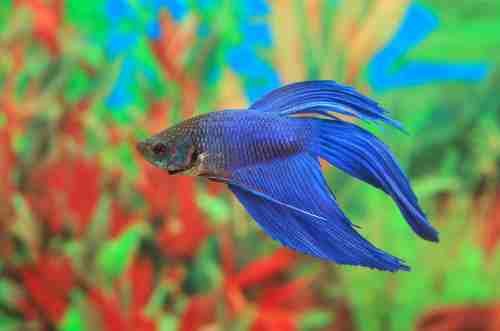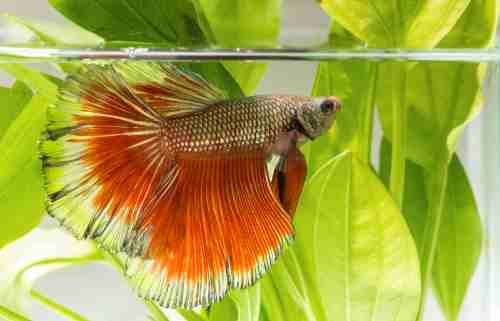Betta fishes, also known as the Siamese Fighting Fishes, are one of the most loved Fish in aquariums. They can survive extreme conditions and even go on for days without food. It is easier to care for and maintain them.
What length of time can a Betta fish survive without food? This is a question that can be answered in 7 days. However, if your tank is kept in the best conditions possible, your Fish will be capable of living without food for two whole weeks. Two whole weeks!
This article is for fish owners concerned that their betta fish is not getting enough food or might want to avoid feeding them.
How long can Betta Fish go without food? 3 Important Factors

As we mentioned earlier, betta fish can survive for 10-14 days on their own without food. Be sure to keep your betta fish safe and well-fed.
If you want your Betta to return to a calm, relaxed environment, you should leave it in a well-established aquarium.
You should take some crucial steps before you leave if hiring fish sitters isn’t an option.
Three main factors determine how long a Betta fish can live without food.
- Tank size.
- Filtered vs. unfiltered tank;
- Betta’s general well-being.
Size
Your tank’s size is the most critical factor in determining how long your betta fish will survive without food. It doesn’t only affect how long the Betta can go without food but also the conditions it is swimming in.
The slower the tank gets decrepit, the smaller it will be. This means that your Betta can survive for a few days without food but still need to live in poor conditions.
Filtered vs. Unfiltered Tank
Similar to how smaller tanks require more frequent maintenance, so do unfiltered betta tanks.
The unfiltered fishbowl trend among betta-fishkeepers isn’t generally harmful to pet fish as long as the bowl is reasonably sized and bettas have easy access to the water surface to allow oxygenation.
If you’re going to be away for longer than 10-14 days, your water quality will likely drop to dangerous levels in an unfiltered tank.
Betta Fish General Health
It is important to remember that bettas, while all unique, can respond differently to different environments.
They will have to consider their age, metabolism, and general health. These factors will influence how Fish react to being stressed, hungry, and under poor water conditions for 10-14 days.
Younger betta fish may be able to deal with stress better than older Fish, while a mature fish might have more fat resources to draw on when hunger strikes. Different Fish will react differently.
It would help if you remembered that allowing your Betta to fast for an extended period shouldn’t become a habitual behavior. It is best to leave your tank for a short time if necessary.
A Day or Two Without Feeding Your Betta Can Be Healthy
It might seem crazy to give your Betta food for only a day, but this can be very healthy for your pet.
These Fish will often eat any scrap food offered to them.
If you keep feeding them food, they will continue to eat it. Overfeeding your betta fish is a risky thing.
Overfeeding proves detrimental to Betta Fish’s health. Many health issues can be caused by overfeeding, such as swimmer issues and unhealthy weight gain.
This means that Betta Fish should be under-fed rather than over-fed.
This being said, ensure they have enough nutritious food!
Allowing your Fish to eat for only a day will allow them to absorb the nutrients from the foods they have consumed over the previous few days.
This will eventually lead to a positive effect on your Betta’s overall health and well-being. Between meals, a minimum of one day is required to allow your Betta to live for longer.
What Do You Do If Your Fish Isn’t Eating?
You can also determine how long a Betta Fish goes without eating by what you feed it.
Betta Fish prefer a diet that is high in protein. Bettas love to eat carnivorous seafood.
They love insects and larvae.
This is why you should provide them with protein-rich food and without fillers such as wheat or corn.
They may not eat protein-rich food if they aren’t fed enough.
It is possible to replicate the diet of Betta Fish using high-quality flakes/pellets.
For a balanced diet, give your pets live, frozen, and freeze-dried foods along with the pellets.
Betta fish pellets are best fed by not following the instructions on the bottle.
This is because the instructions can be vague and misleading.
Betta Fish have small stomachs. You don’t want too much food and more waste.
Betta Fish should generally be fed at least twice daily, six days a semaine.
Don’t Use Vacation Feeders
These blocks are made of white and contain food. These blocks gradually dissolve in water to release food that Betta can eat.
The food in these blocks is usually not very specific and of poor quality. It typically contains plant-based ingredients, which can harm your Betta’s health.
Alarmingly, these blocks cannot dissolve in water at the same rate as other materials.
The dissolution rate of these products is highly variable. This means you could get one that dissolves between 30 and 50 times per hour or another that stays dissolved for two weeks.
Betta can easily become malnourished or starved in either case.
Therefore, the swim bladder is typically the first organ to be affected. This causes Fish to sink and float.
Constipation is a condition that causes Fish to stop functioning properly and can last for longer periods.
Final Thoughts
Betta fish are one the rarest and most resilient species of Fish that can survive long periods without food.
To ensure that your Fish thrives and stays healthy, you must create an ideal environment.
Betta Fish can live up to 14 days without food. But, it’s best to give your pet food every 5 days.
